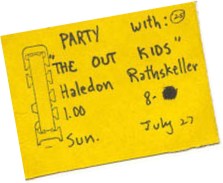 Haledon,
New Jersey (USA). It's here, in this little town in the NY area, where the
story began. In the mid-seventies, when the punk era was about to explode,
Glenn Mercer and Bill Million started playing together in a band called
The Outkids.
Haledon,
New Jersey (USA). It's here, in this little town in the NY area, where the
story began. In the mid-seventies, when the punk era was about to explode,
Glenn Mercer and Bill Million started playing together in a band called
The Outkids.
The drummer was Dave Weckerman, while Glenn played guitar and Bill the bass
guitar.
They toured for a while in the area, and in 1976, when they met Keith Clayton
(bass) and Vinnie DeNunzio (drums), Bill changed to the rhythm guitar and
Dave to percussions: The Feelies were born.
It took some time before the band could enter a studio to
record its first album. In the
meantime the drummer changed again, Anton Fier joined the group. In
1978 the Village Voice dubbed the then-unsigned Feelies "The Best
Underground Band in New York", and one year later they finally published
their first single: Fa CÚ-La (Rough Trade). Then a few months later the
band signed with Stiff and in 1980 Crazy
Rhythms was released.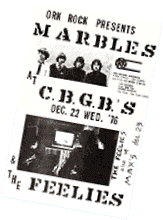
It's a wonderful record, very original compared to the
punk/new wave
scene of those years. With nervous drumming, unconventional silences between songs, and a wonderful guitar sound, Crazy Rhythms
is a masterpiece that influenced a lot of musicians: one name above the others,
R.E.M.
But something went wrong. Despite the enthusiastic critics on both sides of the
ocean, the
record didn't sell very well; moreover, the band didn't like to play live so they
made
relatively few promotional shows, and people at Stiff didn't appreciate it.
And
the group was not satisfied with the label too: they had the impression that Stiff was
more interested in self promotion than in bands' development. These problems
culminated with Stiff's total displeasure with a demo tape of new material
which The Feelies sent them. So eventually the band and the label
decided to mutually part ways. By the way, several of the songs included in
that demo tape later appeared on The Good
Earth.
Keith
Clayton quit the band and so did Anton Fier (he joined the Lounge
Lizards and later he founded the Golden Palominos).
Nobody officially heard of the Feelies anymore for about 5 years. However, in this period
Glenn, Bill and Dave continued to be active with new projects: first The Willies
(that
produced no records) and then The Trypes;
here they started playing with Brenda Sauter (bass) and Stanley Demeski (drums). The Trypes made a very good EP called The Explorers Hold, four songs in a
particular psychedelic mood.

Second Life

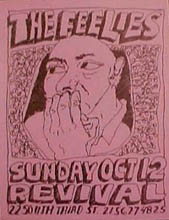 Around 1985 Glenn, Bill and
Dave started playing again as The Feelies with Brenda and Stan as new members, and a year later they released a new album,
The Good
Earth. The sound changed a lot and it was marked by slower rhythms and
acoustic guitars, so that someone could think that Peter Buck (R.E.M.),
who appears in credits as co-producer, had some
influence on it. Actually though he helped the band in many other ways, Buck
had very little to do with the production which, as always, was mostly handled
by Bill and Glenn. A very good record, anyway, as well as No One Knows, an EP published at the end of 1986
which contains two covers of the Beatles and Neil Young's
songs.
Around 1985 Glenn, Bill and
Dave started playing again as The Feelies with Brenda and Stan as new members, and a year later they released a new album,
The Good
Earth. The sound changed a lot and it was marked by slower rhythms and
acoustic guitars, so that someone could think that Peter Buck (R.E.M.),
who appears in credits as co-producer, had some
influence on it. Actually though he helped the band in many other ways, Buck
had very little to do with the production which, as always, was mostly handled
by Bill and Glenn. A very good record, anyway, as well as No One Knows, an EP published at the end of 1986
which contains two covers of the Beatles and Neil Young's
songs.
In the same year the Feelies had also the
opportunity to work with director Jonathan Demme, who was realizing Something Wild.
They had met some years before, and Demme liked the band very much so he asked
them for a short appearance in the movie: they played few songs as The Willies during
a high school reunion
party.
Another side project started in
1987: Yung
Wu made their first and only album, Shore Leave, a nice record containing 7
new original tracks and 3 covers. The line-up is the same as the mother band plus
John Baumgartner on keyboards, but here Dave Weckerman is the lead singer and the author of all the original
songs.
The
third official album of the Feelies came out in 1988: called Only Life,
it's another masterpiece. The sound is someway a melting of the first two
records, with more electric guitars and a harder drumming (reminding in part
of those crazy rhythms of their debut) but also with the quiet
atmosphere of the predecessor. A wonderful record.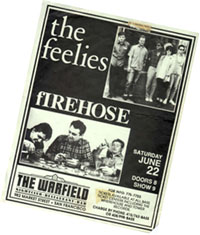
The Feelies started then a cross-country tour
with Lou Reed, even if they still didn't like to play live,
and
thanks to some promotion by their new label (they got signed to A&M) their
audience grew up. Unfortunately, A&M was bought by
Polygram, a big corporation whose management didn't care a lot about the band. Despite this
situation, the group entered the studio to record its next album with
a higher budget and the band was very relaxed during the recording sessions.
Time For A Witness
was out in 1991: the
record didn't really mark a step forward in the evolution of the band, the sound is
along the same
lines as the previous one, maybe slightly harder.
Still, Time For A Witness is a very pleasant album, very well written and
containing a bunch of excellent songs that will stay among their classics.
Nevertheless, the following tour was someway a failure: for the first time the band was convinced by their manager to play in theaters
instead of clubs, but they weren't famous enough to fill them completely,
which caused a lot of frustration.
Eventually, in the summer of '91 Bill
felt he had to stop: he lost interest in music, so he left the group and moved to Florida with his family.
The Feelies split
up and each member started new personal projects, and that was it
for almost 17 years...

The Come Back

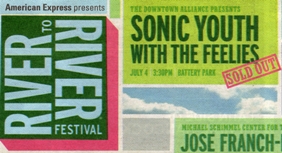 Then,
one day in the beginning of 2008 the first rumours of a possible reunion
started.
Actually after a Yung Wu reunion show in 2001, all the Feelies except
Bill already played on Glenn's first solo album the year before.
Then,
one day in the beginning of 2008 the first rumours of a possible reunion
started.
Actually after a Yung Wu reunion show in 2001, all the Feelies except
Bill already played on Glenn's first solo album the year before.
Glenn and Bill had been talking for
some time about the possibility of a
reunion, and eventually in the spring of 2008 when Sonic Youth guitarist Thurston Moore asked
them to open the 4th of July show at the River to River festival in NYC, they
just felt that the time was right to come back.
So on June 30th, 2008 at
their "home" venue, Maxwell's in Hoboken, NJ the Feelies played their
first show in 17 years with the now classic five-member line up: Bill, Brenda,
Dave, Glenn and Stan. This first concert was followed by two more in the
same venue and the one in Manhattan the 4th of July. From then on the band
played live quite regularly four times a year, mainly in the NY/NJ area but
also in Boston, Washington and Chicago. The tracklist of the shows included all their classics plus some old and new covers. After some
time the band started playing also a couple of new songs, then the new tracks
became three, four... and the rumours about a brand new album
began.
![]()